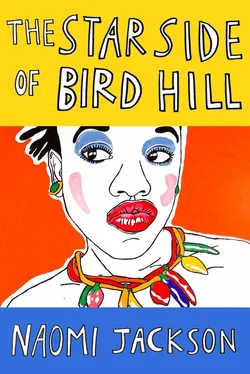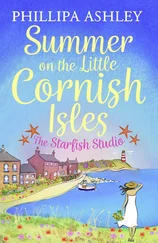As soon as Phaedra was old enough to write, she wrote to her grandmother. At first, she just added a few x ’s and o ’s at the end of her mother’s letters. But soon, she was writing her own short letters every month, catching her grandmother up on what she was learning in school, which psalms she knew by heart, pretending that she’d made closer friends than she had. It was hard for Phaedra to reconcile the hardness in Avril’s voice when she talked about Barbados in general and Bird Hill in particular with the peaceful place Hyacinth described. But the different ways Phaedra and her sister saw the world in general and their parents in particular taught Phaedra that two people could feel different ways about exactly the same things, and that they could both be right.
It was Phaedra’s grandmother who told her that she should start keeping track of her dreams. Her mother bought her a dream catcher at a powwow out at Floyd Bennett Field, and she placed it above her bed in Brooklyn, hoping to hang on a bit longer to the Technicolor pulse behind her eyes. Avril always told her that dreams were just another world we lived in, different from but related to the waking world.
In her grandmother’s house, there was a carafe filled with water on the night table that Phaedra sipped from each morning to help her remember where her dreams had taken her. There was another glass of water beneath the bed to catch tricky spirits. The carafe was one way Phaedra knew that beauty was not something reserved for the wealthy, but a common, everyday kind of thing that was available to anyone with eyes open enough to see. Phaedra had taken to writing down her dreams, imitating her grandmother, who kept a notebook by her bedside for precisely this purpose.
For days, Phaedra dreamed of schools of flying fish jumping out of the water, not unlike the ones she’d seen on Sunday afternoons after church when Hyacinth let her and Dionne go to the beach with the Lovings. The third day she dreamed of fish, she woke up later than usual, having slept in to savor the feeling of the sun on her skin and the light reflecting the fishes’ silver flesh. When she awoke, she wandered into the kitchen, where her sister and grandmother were mixing salt fish and flour together for fish cakes.
“Good morning, Granny,” Phaedra said, hugging her grandmother from behind. She felt Hyacinth stiffen at her embrace, but she leaned in further to smell the nutmeg on her housedress.
“Well, hello. I see Sleeping Beauty finally decide to wake. What sweet you this morning so?” Finally too uncomfortable, Hyacinth pulled herself free from Phaedra’s grip, making an excuse of reaching for the fish draining in a colander.
“I had the best dream. I dreamed we were all at a picnic at Pebbles Beach and the flying fish were jumping so high it looked like they could touch the sun.”
“Hmmm, have you ever thought that maybe you were just dreaming that because we’re going to the beach later?” Dionne asked.
“We are?” Phaedra said, the pitch of her voice turning up with excitement.
“Yes, darling. You don’t remember the church picnic is today?” Hyacinth looked out at the plants encroaching on the white hydrangeas below her kitchen window. “Looks like a whole army of weeds take over my garden. I don’t know how it is that I have two strong girls here with me and I still have to be bending down and cleaning up all the time as if I’m a young person.”
“What do the fish in my dreams mean, Gran?” Phaedra asked.
“It means a baby soon come. Take note, darling, and see if your dreams don’t bear fruit.”
Phaedra looked out through the picture window at the bananas, which she still couldn’t call figs like everyone else did. The banana trees she’d imagined stretched their branches high to the sky, not fat and squat to the ground, heavy with fruit that turned purple like Jean’s skin before they ripened. Maybe the baby would come just like the fruit on that tree, she thought, upside down and not at all how she expected it.
“So fish mean babies?”
“You dream of fish and a baby soon come. Dream of a wedding and it’s a funeral around the corner. Dream of a funeral and somebody’s getting married soon,” Hyacinth said.
Phaedra jumped when she heard the pop and hiss as Hyacinth lowered the first few tablespoons of batter into hot oil.
“OK, OK, that’s all I can remember for right now,” Phaedra said.
Phaedra left the kitchen wondering where this child might come from. Her absent wonder almost made her chores go by quickly.
THE BIRD HILL CHURCH of God in Christ 75th Anniversary picnic was a highly anticipated affair. For months before it happened, the head of the church picnic committee, Mrs. Gumbs, made announcements from her seat in the third pew, much to the annoyance of the elders who said they didn’t want to strain their ears or crane their necks to hear what she was talking about. Mrs. Gumbs, mother to Clotel Gumbs and four other children with equally stingy portions of character and ambition, stood her ground, saying that she was neither usher nor deacon nor reverend and therefore did not belong in the sanctuary except on Saturdays when she cleaned it with the others from the Women’s Guild. It was this kind of obsequiousness that got the gullets of Hyacinth and the other hill women. Phaedra could hear but did not listen to Mrs. Gumbs’s long speeches because by then the service had usually gone on for three hours and she could practically taste the cookies from the after-service repast; just the thought of sugar melting against her tongue and the maraschino cherry at the cookie’s center, which she always saved for last, made Phaedra ache with longing.
Phaedra marveled at the elaborate headpieces Mrs. Gumbs wore, intricate concoctions with beads and plumes and straw that drew attention away from the massive chest and stomach that she wore with a kind of pride, having appointed herself the mother of the church. Some of the words floated through Phaedra’s haze of hunger and boredom—“rousing success” and “pitch in” and “many hands make light work”—but mostly Phaedra was fascinated by Mrs. Gumbs’s matronly swagger, which was so different from the kind her mother had. Phaedra looked at the peacock hat Mrs. Gumbs wore on the last Sunday before the picnic and whispered to Chris that he might have to go hold down the bird before it flew off her head. She realized that she was being uncharitable and straightened up a bit when her grandmother shot her a look that Phaedra knew wasn’t nearly as deadly as the ones she normally gave her. She’d overheard Hyacinth talking to Ms. Zelma, saying that she was surprised Pauline Gumbs had not yet sat upon and crushed up the little piece of man she called a husband.
Phaedra’s stomach grumbled with anticipation on the Sunday before the picnic when she heard all the items on the menu: stew chicken, rice and peas, cook-up rice, flying fish, pudding and souse, yam pie, macaroni pie, potato salad, fried chicken, and Phaedra’s favorite, fish cakes. For the whole week that followed, Phaedra imagined the food she’d eat at the picnic. It was easy to forgive Mrs. Gumbs’s droning on about the powers of fellowship and the gift of Christian community when she called out the food in a way that made Phaedra see, taste, and touch it.
The day of the picnic came and everyone was at church at the appointed hour, just after eight o’clock when the sun hadn’t yet got going. They lined up beside the school buses with beach towels and beach chairs, coolers brimming with ice and drinks, long aluminum pans filled with food, napkins, and paper towels and painkillers, diapers, and changes of clothes. They were wearing outfits they had waited for weeks to show off, only to shrug off compliments with words like “this old thing” and “just something I had in my closet.” Looking at the hill people assembled, you would have thought they were leaving on a long journey to see Jesus Christ himself, even though it took at most two hours to drive from Bird Hill in St. John to Folkestone Beach on the west coast.
Читать дальше












